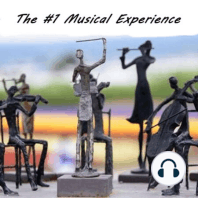33 min listen

Beethoven Symphony no. 5 in Cm, Op. 67 - III. Allegro attacca
Beethoven Symphony no. 5 in Cm, Op. 67 - III. Allegro attacca
ratings:
Length:
16 minutes
Released:
Dec 24, 2019
Format:
Podcast episode
Description
Why We Should Expose Our Kids To Classical Music https://ourtownlive.net #herbw79The Symphony No. 5 in C minor of Ludwig van Beethoven, Op. 67, was written between 1804 and 1808. It is one of the best-known compositions in classical music and one of the most frequently played symphonies,[1] and it is widely considered one of the cornerstones of western music. First performed in Vienna's Theater an der Wien in 1808, the work achieved its prodigious reputation soon afterward. E. T. A. Hoffmann described the symphony as "one of the most important works of the time". As is typical of symphonies in the classical period, Beethoven's Fifth Symphony is in four movements.Like Beethoven's Eroica (heroic) and Pastorale (rural), Symphony No. 5 was given an explicit name besides the numbering, though not by Beethoven himself. It became popular under "Schicksals-Sinfonie" (Fate Symphony), and the famous five bar theme was coined "Schicksals-Motiv". This name is also used in translations.The Fifth Symphony was premiered on 22 December 1808 at a mammoth concert at the Theater an der Wien in Vienna consisting entirely of Beethoven premieres, and directed by Beethoven himself on the conductor's podium. The concert lasted for more than four hours. The two symphonies appeared on the programme in reverse order: the Sixth was played first, and the Fifth appeared in the second half. The programme was as follows:The Sixth SymphonyAria: Ah! perfido, Op. 65The Gloria movement of the Mass in C majorThe Fourth Piano Concerto (played by Beethoven himself)(Intermission)The Fifth SymphonyThe Sanctus and Benedictus movements of the C major MassA solo piano improvisation played by BeethovenThe Choral FantasyThe Theater an der Wien as it appeared in the early 19th centuryBeethoven dedicated the Fifth Symphony to two of his patrons, Prince Franz Joseph von Lobkowitz and Count Razumovsky. The dedication appeared in the first printed edition of April 1809. Get bonus content on Patreon Hosted on Acast. See acast.com/privacy for more information.
Released:
Dec 24, 2019
Format:
Podcast episode
Titles in the series (100)
Edvard Grieg - Peer Gynt Suites 1 & 2 (1888-91): Why We Should Expose Our Kids To Classical Music https://ourtownlive.net #herbw79Grieg (1843-1907) was one of the definitive leaders of Scandinavian music and his influence was great. Although composing many short piano pieces and chamber works,... by The #1 Musical Experience